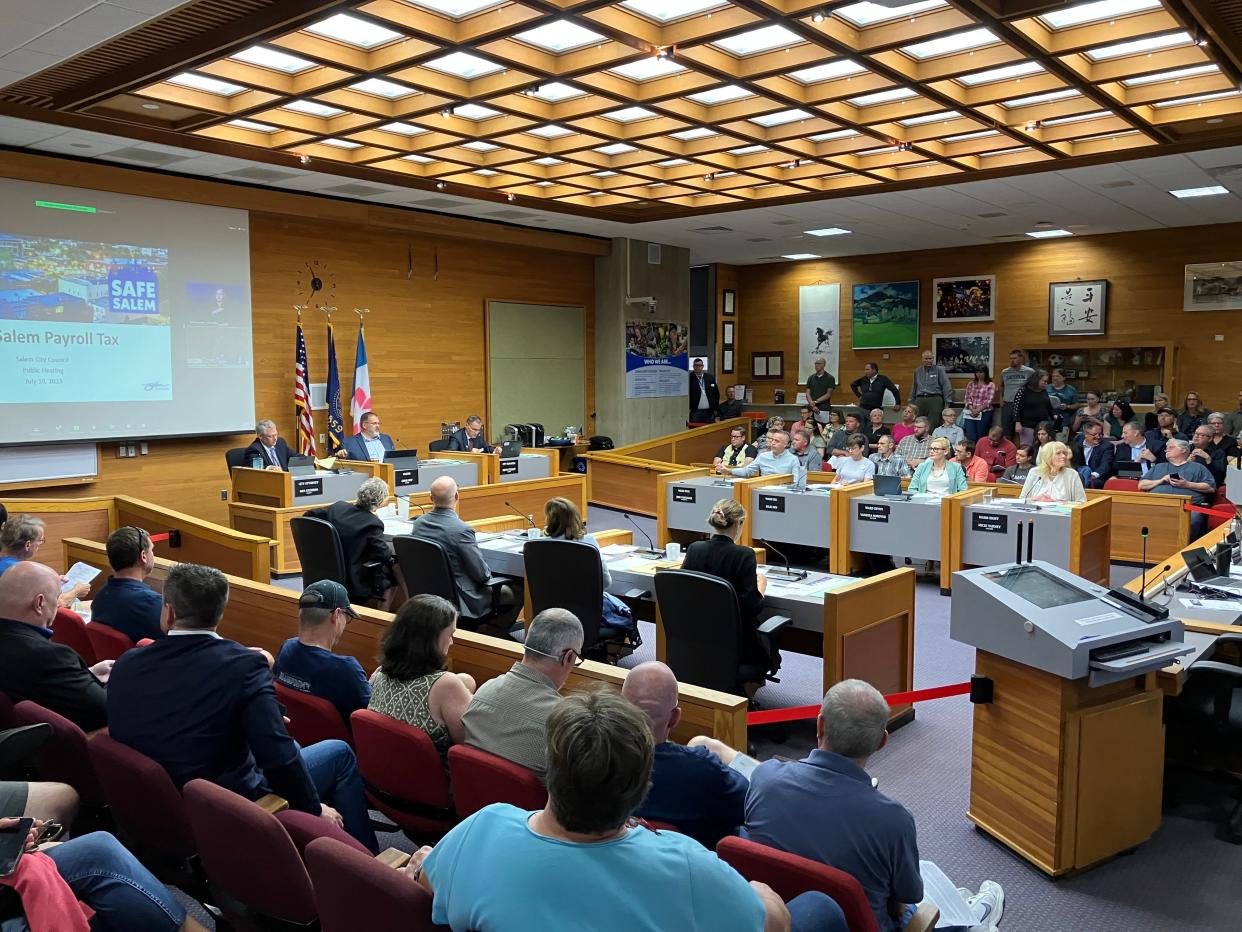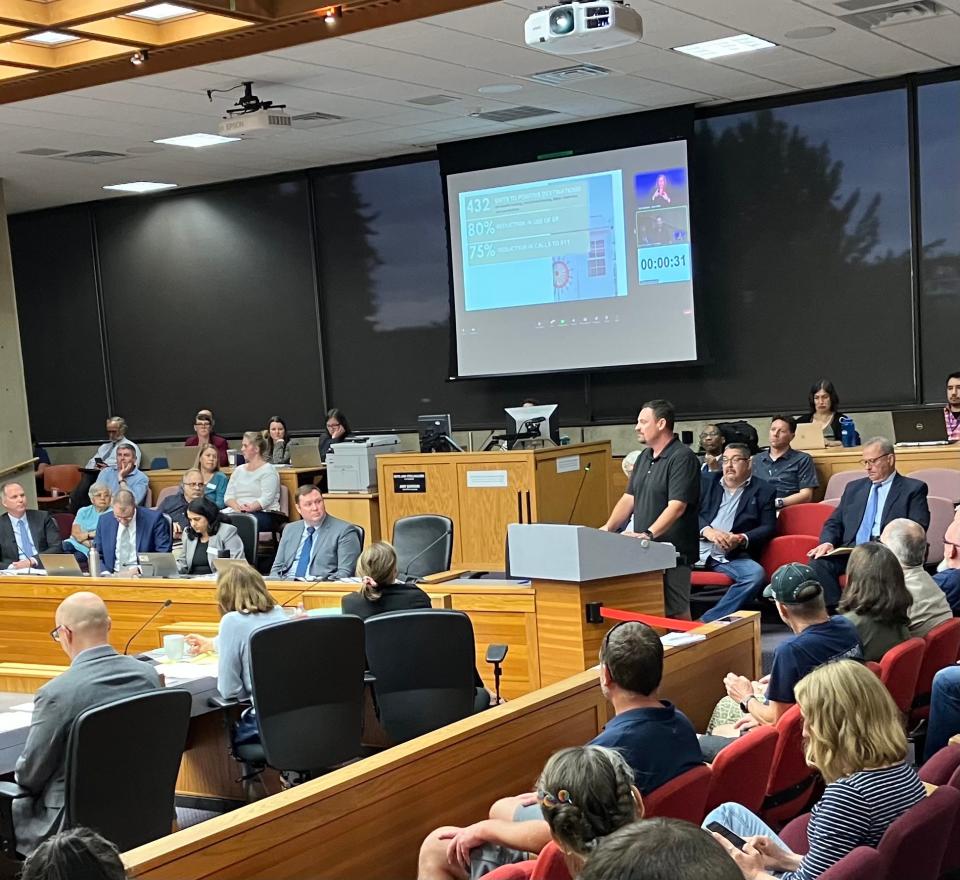Salem council approves wage tax to pay for fire, police, homelessness services

After four hours of public testimony and debate, Salem City Council voted Monday night to approve a new wage tax to pay for fire, police and homelessness services.
The "Safe Salem" payroll tax will be imposed on wages for individuals working in Salem, regardless of where they live, as early as July 2024. The tax would not be imposed on those earning minimum wage.
A payroll tax calculator is available at egov.cityofsalem.net/PayrollTaxCalculator/. A person earning the average hourly rate of $29.90, which equates to $62,192 a year, would be taxed $42.19 a month — $506.24 a year.
The funds generated could only be used for community safety, which includes police services, fire, emergency medical services, 911 call services, code enforcement and unsheltered services.
Members of the public filled Salem City Council Chambers for the meeting. More than 200 pages of written testimony were submitted to the city, most in opposition to the proposed tax.
The motion to move the payroll tax forward passed in a 5-4 vote, with councilors Julie Hoy, Vanessa Nordyke, Deanna Gwyn and Jose Gonzalez voting against it.
Julie Hoy sought to extend the public comment period and send the issue to voters. Both motions failed with the same divide.
Gwyn chided the council for moving forward with the payroll tax.
"Shame on you," she said. "Shame on you."
Mayor Chris Hoy took issue with her statement, saying it was okay to disagree but personal attacks were unnecessary.
"That's not appreciated," he said.
The proposed tax would bring in an estimated $27.9 million annually. City officials said the funding is needed to maintain current services in light of a projected budget shortfall.
When questioned by council, city chief financial officer Josh Eggleston said other departments would have to be cut to overcome the funding gap with police and fire.
"We could reduce parks," Eggleston said. "We could reduce library."
Mayor Chris Hoy pressed him further.
When you say reduce, what do you mean, he asked.
"Eliminate," Eggleston replied. "You could eliminate those services and still not reach the target that we need to hit."
Related: What’s on the line as Salem faces $11M budget shortfall? Here are 5 things to know
'You need to do better'
Residents and business owners said the tax would be overly burdensome on workers, especially during these times of high inflation and cost of living.
Some said it would keep them from paying their rent and push people into homelessness.
"Taking my hard-earned money doesn't sit well with me," said one resident. "You need to do better with what you have. Hands off my paycheck."
Jolene Koch said she drives an hour to work in Salem and faces taxation without representation.
"I got three kids... I don't need another tax," she said tearfully.
Others representing businesses and organizations voiced their opposition.
"Businesses operate in a competitive labor market," Salem Electric general manager Tony Schacher wrote in a letter to the council. "If implemented, we believe the proposed payroll tax will create a barrier for many Salem businesses to recruit and retain skilled employees who are essential to their operations."
In a 2-1 vote, the Polk County Commissioners signed testimony opposing the payroll tax as unfair to workers who could neither vote on this proposal nor have a representative in city government that they could vote out of office for the decision.
In the letter, the commissioners cited the fact that many Polk County residents who commute to work in Salem do not live in the city. They questioned the constitutionality of the "tax scheme."
"For the citizens of Polk County that will be impacted by this tax plan, we implore you to reconsider this faulty taxing scheme and any other that fails to consider the sanctity of transparent government and the relationship of trust to those that govern," the letter stated.
Corri Falardeau, executive director of the Keizer Chamber of Commerce, estimated the tax would cost residents of Keizer who work in Salem $3 million.
Mike Erdmann, chief executive officer at Home Builders Association of Marion & Polk Counties, urged the council to bring the issue to voters. He said the shortfall was a self-inflicted problem.
"The city has kicked the can down the road for several years and now it finds itself needing to act rapidly," he said.
Erdmann said the construction and contracting industries were concerned about the burden of the tax and their ability to attract workers.
Protecting existing services
Leaders with Church at the Park, which manages the city's microshelter villages and provides services to homeless people throughout the region, wrote in support of the payroll tax, saying it would fund vital programs, keep people safe and limit the number of encampments in the city.
"Aside from the fact that living in encampments is unsafe and unhealthy, it burdens our emergency services, and it costs the city and taxpayers exorbitant money," Church at the Park leaders said in a statement of support.
Almost 200 people are living at the city's two microshelter sites. Hundreds more have passed through the shelters since the villages opened in 2021. The majority have moved on to positive destinations like permanent housing and transitional living, according to DJ Vincent, founding pastor with Church at the Park.

"According to Salem’s city manager, if the tax does not pass, funding to the homeless navigation center and C@P’s Village of Hope and CCS sites would likely be the first cuts," organization leaders said.
This means those 200 people would be back living in vehicles and parks, they added.
Vincent testified in favor of the tax and tried to illustrate what would happen if the city said "no" to funding programs like the microshelters.
He said 400 people are currently on the waitlist and over the years, the program has helped shelter 935 people.
Paul Tigan, an outgoing member of the city's Citizen Budget Committee, said Salem could not cost-cut its way out of a deficit.
Faced with the unpopular decision of raising revenue or cutting costs, the city risks slashing its budget into being a less livable, less safe community, he added.
Fire Chief Mike Niblock said the department would lose 35 firefighters, two to three fire stations and would see their response time lag if they do not get the funding the payroll tax would provide.
Salem Police Chief Trevor Womack said the increase in violent crime means more resources are pulled to focus on major investigations.
Adding officers means the city can return to proactive policing and increase safety in high-crime areas, he said. If the funding is not sustained for 49 police officers, the city risks losing that proactive policing, he said.
Handcuffed by state restrictions
Officials said Salem is not the only city facing a budget shortfall.
"Cities across Oregon are facing similar structural imbalances between revenues and expenditures," city manager Keith Stahley said, pointing to state property tax measures from the 1990s that cap tax revenues as one the reasons behind the deficit.
As a result, the money the city receives from property taxes is not keeping up with inflation and population growth.
The city has known for years it would be facing a shortfall.
City leaders reduced services and slowed hiring in the years since the 2008 recession to keep general fund services solvent. Before the pandemic, the city added the city operations fee and considered putting an employee-paid payroll tax on the May 2020 ballot.
The pandemic put a pause on the payroll push.
Stahley said the city has been in survival mode for the past 15 years and is operating on a razor's edge.
Other cities in Oregon have opted to add a payroll tax to address budget shortfalls.
In 2021, Eugene implemented a payroll tax to pay for new police officers, emergency services and homelessness reduction efforts. It was set to generate $23.6 million annually.
Salem's proposed ordinance states that the tax will be referred to Salem voters by July 1, 2031, to decide whether to keep it in place. The tax will terminate on Dec. 31, 2031, unless voters opt to continue it.
More information is available at cityofsalem.net/government/shaping-salem-s-future/safe-salem-2023.
For questions, comments and news tips, email reporter Whitney Woodworth at wmwoodworth@statesmanjournal.com, call 503-910-6616 or follow on Twitter at @wmwoodworth
This article originally appeared on Salem Statesman Journal: Salem approves a payroll tax to pay for emergency services

